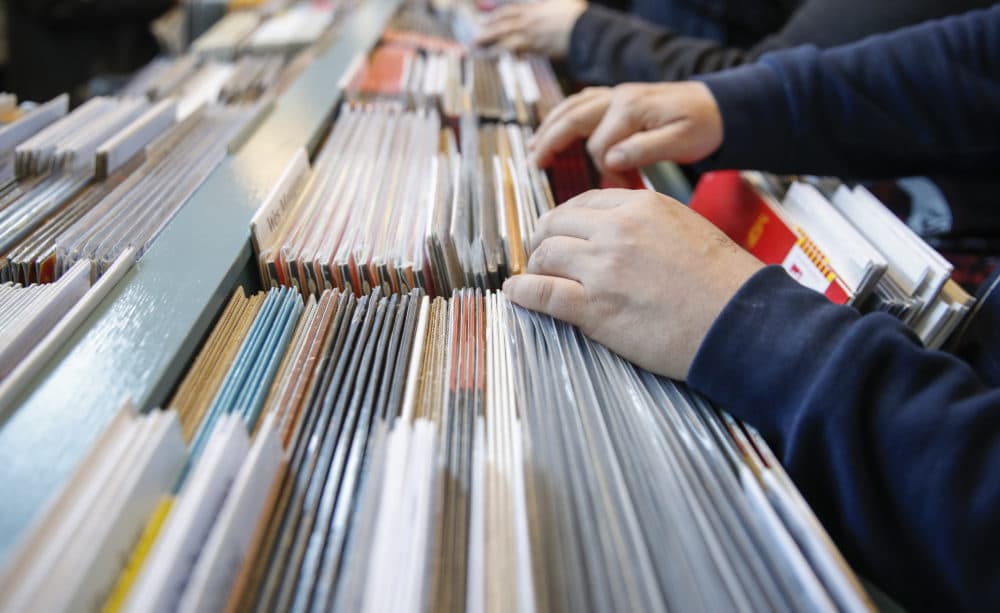Advertisement
'A Strange Feeling': Owner Of Seattle's Bop Street Records Reflects On Closing Shop After 30 Years
Resume
Visiting a good record store is a one-of-a-kind experience: the exploration and discovery, the smell of thousands of records, the feeling of touching a vinyl record.
For over 30 years, music lovers flocked to Seattle's Bop Street Records — but now the home of 500,000 records will close its doors at the end of June. Driven to an early retirement by the COVID-19 outbreak, owner and record collector Dave Voorhees says moving on from his routine of putting up the open sign and turning on the music feels “surreal.”
“It's going to be a strange feeling when I look in this location and it's empty,” he says. “It's going to be weird. It may not have actually struck me yet.”
Once one of the top five record stores in the nation, Bop Street Records opened in 1979 and settled in the neighborhood of Ballard in 1984. Now, he plans to continue selling records online.
Before the COVID-19 pandemic, Voorhees planned to renew the lease but later changed his mind. He says he respects Gov. Jay Inslee and Mayor Jenny Durkan for putting restrictions on nonessential businesses — though selling records feels essential to him.
Most of his customers are first-time record buyers from Europe or other parts of the world, he says, so the lack of foot traffic impacted business.
Voorhees’ love of records started when he bought a Fats Domino 45, or single, at age 8 and received “The Buddy Holly Story” on vinyl for his 10th birthday in December 1959, months after Holly died.
He loved the record and once entered a lip-sync contest with the song “Oh, Boy!” — though he says a mustache made him look more like “Weird Al” Yankovic than Holly.
“I listened to that thing over and over and over. Sometimes if I hear a particular Buddy Holly song, I'll expect to hear the next song on the album,” he says, “because it's sort of ingrained to me the sequence, the order that those songs were on the record.”
Before opening Bop Street, Voorhees started selling blues records out of his parents’ basement in 1974.
While Voorhees worked at a used record store, a customer came in with a shoebox full of blues 45s that he bought from his brother in Texas. In the small town of Angleton, Texas, a jukebox distributor was selling 100,000 45s for a dime apiece.
After a three-day drive with a friend, Voorhees spent $300 on 3,000 records, kept in boxes with silverfish scurrying around from a dusty warehouse with a dead mouse in the corner.
“I've had a lot of highlights in my life, but that was one of the highlights. It was just pretty incredible,” he says. “I should have bought them all, but I didn't.”
Within two weeks, he started selling records for $2 to $10 each. Word of mouth spread around town and people started calling him to ask to see his records, he says.
One of the rare 45s he bought on the trip was Otis Rush's “I Can't Quit You, Baby” from 1954. After moving to Chicago from the south in the mid-1950s, Rush became an incredible left-handed guitarist who influenced Jimi Hendrix and many later guitarists, he says.
Now, a Goodwill in downtown Seattle is picking up some 16,000 records from the shop to sell, he says.
Over the years, many famous folks browsed the shelves at Bop Street, which was named after the song “Bop Street” by Gene Vincent and His Blue Caps.
Robert Crumb, known as cartoonist R. Crumb who illustrated the album cover for “Cheap Thrills” by Big Brother and the Holding Company, was one of the first. A 78 collector, Crumb spent six hours at the store.
At the end of the day, Crumb brought out a stack of records and asked how much Voorhees wanted for them. Voorhees said he didn’t know, so Crumb offered $75.
Voorhees accepted the offer.
“It's probably about $1,000, maybe $500 worth of records, but he was cool,” he says. “I enjoyed meeting him and talking to him. He actually signed a couple of records for me.”
Ben Gibbard from Death Cab For Cutie used to come into the store. On one occasion, Gibbard introduced his fiance at the time — actress Zooey Deschanel — to Voorhees, who wasn’t yet familiar with her work.
Two weeks after Kurt Cobain died, Dave Grohl came into the store.
“He knows that I know who he is. But he says, ‘I hear you've been selling this rare Nirvana set.’ I looked at him and I said, ‘Who's asking?’ ” Voorhees says, laughing. “He bought it from me. So yeah, it's just been the greatest.”
The legacy of Bop Street goes far beyond a few celebrity appearances. With a tear in his eye, Voorhees says he tried to find music for people and make them feel comfortable in his store with a warm welcome.
“I had a guy call me on the phone just a few days ago and he was actually crying,” he says. “And he just said, ‘I can't express how much joy you brought to me.’ ”
Cristina Kim produced this story and edited it for broadcast with Tinku Ray. Allison Hagan adapted it for the web.
This segment aired on May 8, 2020.



